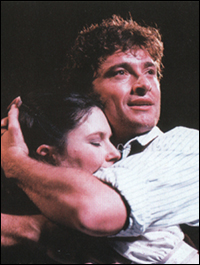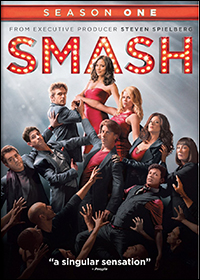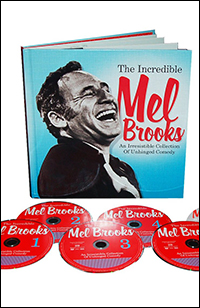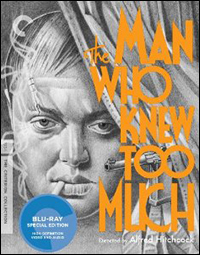
*
Oklahoma!, that 1943 Rodgers & Hammerstein masterwork which set Broadway's long-run musical mark back when a five-year run was unheard of, has remained visible over the years although not so omnipresent as the pair's The King and I and The Sound of Music. The show made brief appearances at City Center in the 1958, 1963 and 1965, with Rodgers himself producing an all-new version at the New York State Theatre (up in Lincoln Center). The first full Broadway revival came in 1979 — Rodgers died two weeks after the opening — with a London transplant the following year.
Things remained quiet until 1998, when director Trevor Nunn and choreographer Susan Stroman brought an all-new production starring Hugh Jackman to the Olivier at London's National Theatre. This was a smashing success, resulting in a commercial transfer starring Hugh Jackman at the Lyceum. Broadway plans were quashed in a dispute over the importation of the British actors, as a result of which this sure thing became something less than sure. It wasn't until 2002 that a drowsy facsimile reached local shores, with Nunn and Stroman but not starring Hugh Jackman (who had in the meantime became a movie star via "X-Men").
Watching the show at the Gershwin — with Patrick Wilson as Curly, playing opposite the Laurey and Jud from London — there were three likely explanations. Either (1) the show was vastly overpraised in London; (2) it lost a tremendous amount in the translation (and in the process of recasting and restaging, presumably by assistants rather than Nunn and Stroman); or (3) both.
The 1999 filming of the London production starring Hugh Jackman, now available on Blu-ray from Image Entertainment, suggests that (2) is the answer. Because this production is, all told, very good. It helps, needless to say, to have Mr. Jackman up there. Not yet a star, he was already clearly a star. But the whole show has a life to it which it sure didn't have when it got to New York. Watching this version, the material seems alive (as opposed to merely seeming like a revered classic). "Pore Jud Is Daid" is a good example of this. I expect that it was pretty lively when originally played by Alfred Drake and Howard Da Silva in 1943. And I'd guess that other couples have done well with it, too. Watching Jackman and Shuler Hensley here, though, the song is funny, morbid and bordering on the dangerous; you think, "ah, what a marvelous piece of writing!" Visit PlaybillStore.com to check out theatre-related DVDs for sale.
 |
||
| Josefina Gabrielle and Hugh Jackman |
||
| Photo by Michael Le Poer Trench |
Image gives us a bonus feature, "The Making of Oklahoma!" The making of the filmed version of the Olivier production, that is. (The film starts and ends with a live audience, yet there is no applause throughout. The bonus explains that after the show closed, they moved the set into a studio so they could more properly film it.) Nunn and Stroman guide us through, with Ted Chapin and Mary Rodgers representing R&H along with comments from Jackman, Gabrielle and Hensley.
Visit PlaybillStore.com to check out theatre-related DVDs for sale.
 |
||
| Cover art |
In this case, the executive producers — including Steven Spielberg, Craig Zadan/Neil Meron, and Shaiman/ Wittman — and creator/head writer Theresa Rebeck give us Anjelica Huston as the producer, Debra Messing and Christian Borle as the songwriters, Megan Hilty and Katharine McPhee as dueling Marilyns, and more. Also on hand in recurring roles are Broadway habitues Brian d'Arcy-James, Will Chase, Dylan Baker, Becky Ann Baker and Michael Cristofer. Guest stars include Uma Thurman, Bernadette Peters and Norbert Leo Butz. All this, plus those canny Broadway-style musical numbers from the authors of Hairspray.
The four-disc set includes all 15 episodes from Season One plus deleted scenes, extended versions of musical numbers, a gag reel and the featurette "Song and Dance," with Shaiman, Wittman and choreographer Joshua Bergasse.
Visit PlaybillStore.com to check out theatre-related DVDs for sale.
 |
||
| Cover art |
The feature films are not included, understandably, as the rights payments would no doubt have been prohibitive; they are readily available elsewhere. (The CD does include soundtrack recordings of some of the musical highlights.) What we get is everything else, though, starting with Mel's first television appearance on a 1951 episode of the "Texaco Star Theater" (AKA "The Milton Berle Show"). He plays stooge to pitchman Sid Stone, and is altogether awkward. There are talk-show appearances; sitcom episodes (including that of the 1965 hit "Get Smart" and one of his Emmy-winning appearances on "Mad About You"); TV commercials; and much much much more. Watch out for two early gems: "Of Fathers and Sons," the spoof of Death of a Salesman that Mel wrote for the Broadway revue New Faces of 1952, featuring Paul Lynde, Ronny Graham and Alice Ghostley; and the Oscar-winning 1963 animated short, "The Critic."
The whole is contained not in a box but within a 60-page hardcover book filled with juicy illustrations from the Brooks atelier plus essays by Leonard Maltin, Robert Brustein, Gene Wilder and Bruce Jay Friedman. No "Producers" or "Young Frankenstein" or "High Anxiety" here; just high insanity.
Visit PlaybillStore.com to check out theatre-related DVDs for sale.
 |
||
| Cover art |
Leslie Banks and Edna Best play the leading roles of the parents, with the child played by 14-year-old Nova Pilbeam (who three years later would be the heroine of "Young and Innocent"). The film is stolen, though, by what might be the first of the great Hitchcock performances. Peter Lorre, having just escaped from Nazi Germany, didn't even speak English yet; he learned his line phonetically, and he is chilling. (The Criterion catalogue also includes Fritz Lang's 1931 classic "M," in which Lorre is absolutely astonishing.)
"The Man Who Knew Too Much" does not quite make it onto the Hitchcockian Top Ten, but it is close. It clearly marked the start of his first string of great pictures, as it was closely followed by "The 39 Steps" (1935), "Young and Innocent" (1937) and "The Lady Vanishes" (1938). At which point Alfred went to Hollywood, where "Rebecca" (1940) began the next stage of his career.
The impeccably pristine digital restoration is accompanied by Criterion's usual assortment of bonus features, including new audio commentary (by historian Philip Kemp); a new interview with filmmaker Guillermo del Toro; "The Illustrated Hitchcock," a 1972 interview with Pia Lindstrom and William K. Everson; and audio excerpts from Francois Truffaut's 1962 interviews with the director.
Visit PlaybillStore.com to check out theatre-related DVDs for sale. (Steven Suskin is author of "Show Tunes," "The Sound of Broadway Music: A Book of Orchestrators and Orchestrations," "Second Act Trouble," the "Broadway Yearbook" series and the "Opening Night on Broadway" books. He also pens Playbill.com's Book Shelf and On the Record columns. He can be reached at [email protected].)









